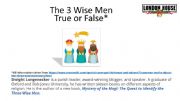
ENGLISH AND AMERICAN FLASHCARDS 1
The first flashcards set on British and American English vocabulary.
Very useful!!!
Level: intermediate
Age: 6-17
Type: flash-card

Will or Going to
The latest worksheet in my grammar collection is to help students distinguish between going to and will. It includes a short introduction to using the present continuous as a future tense.
Level: intermediate
Age: 11-17
Type: worksheet

For or against Traditions (Debating)
Well, here�s another worksheet aimed at debating. Students are first asked to brainstorm on the subject. If they are for or against. Then, I give them the worksheet (with the pros and cons) which I leave them explore in pairs. The ws is mainly aimed at helping ss to take position and also enrich their vocabulary. It is composed of a list of pr...
Level: advanced
Age: 13-100
Type: worksheet

IRREGULAR VERBS PICTIONARY or A POSTER
YOU CAN USE IT AS A WORKSHEET OR AS APOSTER ON YOUR WALL. YOU CAN FIND ITS EXERCISE ON:http://www.eslpri ntables.com/printabl e.asp?id=375011#thet op
Level: elementary
Age: 10-17
Type: worksheet

Do or Make? Consolidation exercises.
Just practice
Level: intermediate
Age: 9-17
Type: worksheet

Adjective or adverb
This WS uses quite advanced vocabulary and ideas designed to push advanced learners. Students must decide which word is appropriate to fill in the gap from 3 options. I hope you find it useful for your students.
Level: advanced
Age: 14-17
Type: worksheet

comparative or superlative?
This is the worksheet I deletet yestarday because it contained some mistakes.
Level: intermediate
Age: 11-14
Type: worksheet

GERUND OR INFINITIVE 2
Students look at the tables and example sentences, then fill in the sentences putting the verbs in brackets into the correct form: gerund or infinitive. Key included.
Level: intermediate
Age: 14-17
Type: worksheet

Passive vs active: visual practice
here is a simple visual worksheet to practice verbs in the passive or active, enjoy and have a great Sunday , Sylvie!:)
Level: elementary
Age: 11-17
Type: worksheet

Picture based conversation. Animal Rights. (Debating) 14/�
A worksheet aimed at preparing my students for their oral exam. They are supposed to react to pictures. They have 15� to prepare and their argumentation should last for about 10�. Therefore I�ve made a series of topical picture compositions. This one deals with animal rights, another of their favorite controversial subjects. Hope this will be u...
Level: intermediate
Age: 12-100
Type: worksheet

for-since-already-ye t-ever-never-just
Some practice about indefinite time expressions with the present perfect. Hope it�s useful!
Level: intermediate
Age: 14-17
Type: worksheet

WHICH IS MORE COMFORTABLE, A CHAIR OR A SOFA?
STUDENTS WRITE QUESTIONS AND ANSWERS USING THE COMPARATIVE.
Level: elementary
Age: 9-11
Type: worksheet

PAST PERFECT OR SIMPLE PAST
SIMPLE PAST AND PAST PERFECT DIFFERENCE IN A SHORT TEXT. AND SOME SENTENCES WITH BEFORE -AFTER-BY THE TIME.HOPE YOU LIKE.THANKS FOR EVERYONE WHO WILL DOWNLOAD MY WS.
Level: intermediate
Age: 12-17
Type: worksheet

Who Are Better Drivers - Men or Women
It is an interesting text (10 Reasons Women Can�t Drive) with Vocabulary Practice - matching words with their meaning, writing out vocabulary on topic Driving, finding irony in the text - and Discussion. I hope you will find it useful! Have a nice day!
Level: intermediate
Age: 11-17
Type: reading

Present or Past Simple?
I sent a similar worksheet two weeks ago: http://www.eslprinta bles.com/printable.a sp?id=697553#thetop
Here is another variant of it to practise Present and Past Simple.
Level: elementary
Age: 8-10
Type: worksheet
|

Sonnet 18
Level: advanced
Age: 15-100
Format: PowerPoint

Christmas True or False 3 Wise Men
Part of a Pub Quiz type trivia
Level: intermediate
Age: 14-100
Format: PowerPoint

To be or not tobe
A presentation made to work together with Powerbase Beginner book.
Level: elementary
Age: 14-17
Format: PowerPoint

the lady or the tiger
interesting reading that everybody should read it
Level: advanced
Age: 13-17
Format: PowerPoint

Simple past or present perfect?
a short power point, shows when both tenses are used
Level: intermediate
Age: 12-14
Format: PowerPoint

Do you agree or disagree
Using famous quotes students talk saying if they agree or disagree and saying why
Level: elementary
Age: 14-17
Format: PowerPoint

ADJECTIVE, COMPARATIVE or SUPERLATIVE ?
Exercises about adjectives, comparatives and superlatives
Level: elementary
Age: 11-17
Format: PowerPoint

Food and drink vocabulary
Match food and drink pictures with words - could be used on IWB instead of being printed
Level: elementary
Age: 8-14
Format: PowerPoint

ING-forms (Gerund or Infinitive)
Presentation of Gerund (using some of the ing-forms)
Level: elementary
Age: 10-12
Format: PowerPoint

Contrast: past simple or continuous ?
A powerpoint to introduce/revise the main points with past continuous: use, spelling, formation plus contrast with past simple. It includes exercise with key.
Level: intermediate
Age: 12-14
Format: PowerPoint

Fact or Opinion Jeopardy
Students decided if the statement is a true fact or an opinion.
Level: elementary
Age: 7-10
Format: PowerPoint

to have to
This presentation can be useful whie learning "to have to" structure
Level: elementary
Age: 10-17
Format: PowerPoint

Game: Right or Wrong?
This game revises the use of present perfect and simple past.
Level: elementary
Age: 12-17
Format: PowerPoint

some/any
some/any
Level: elementary
Age: 11-12
Format: PowerPoint

present -simple or present continuous
Description of difference in use between present simple and continuous.
Level: elementary
Age: 12-17
Format: PowerPoint
|
|